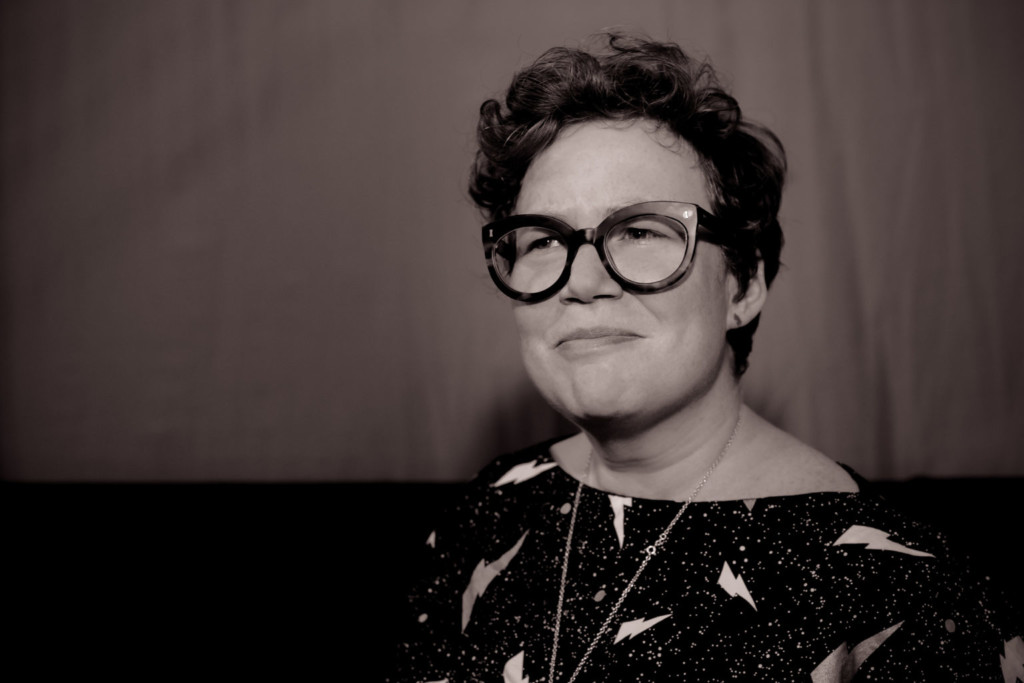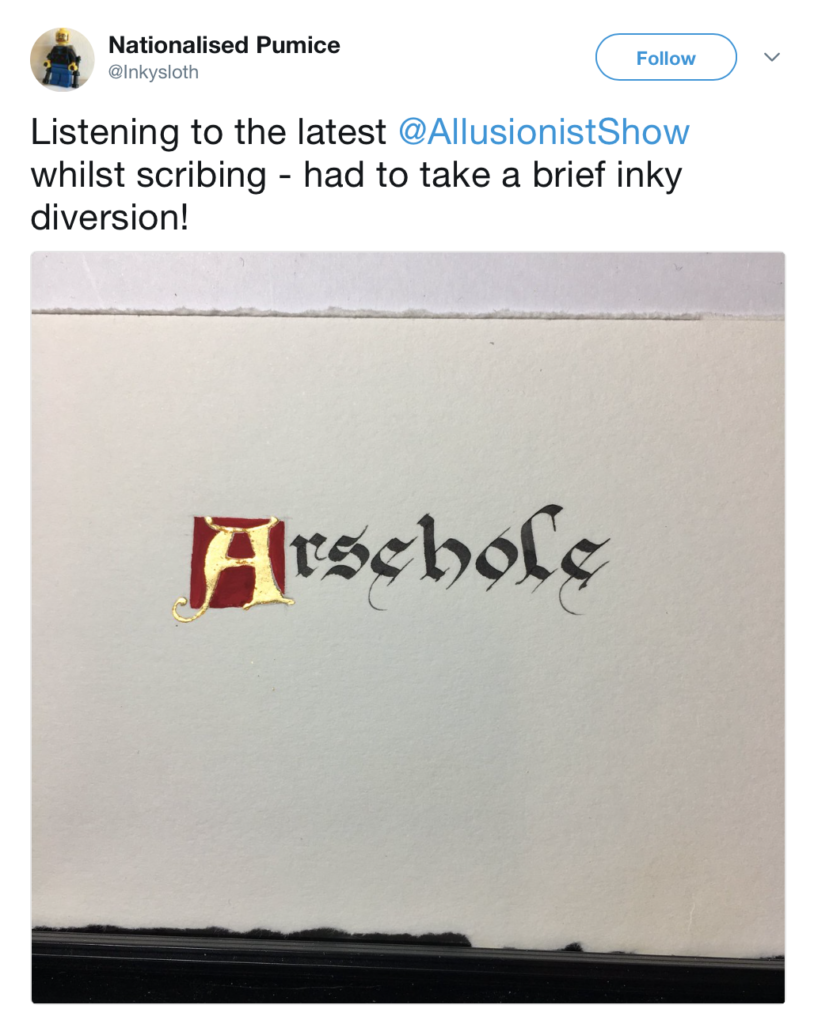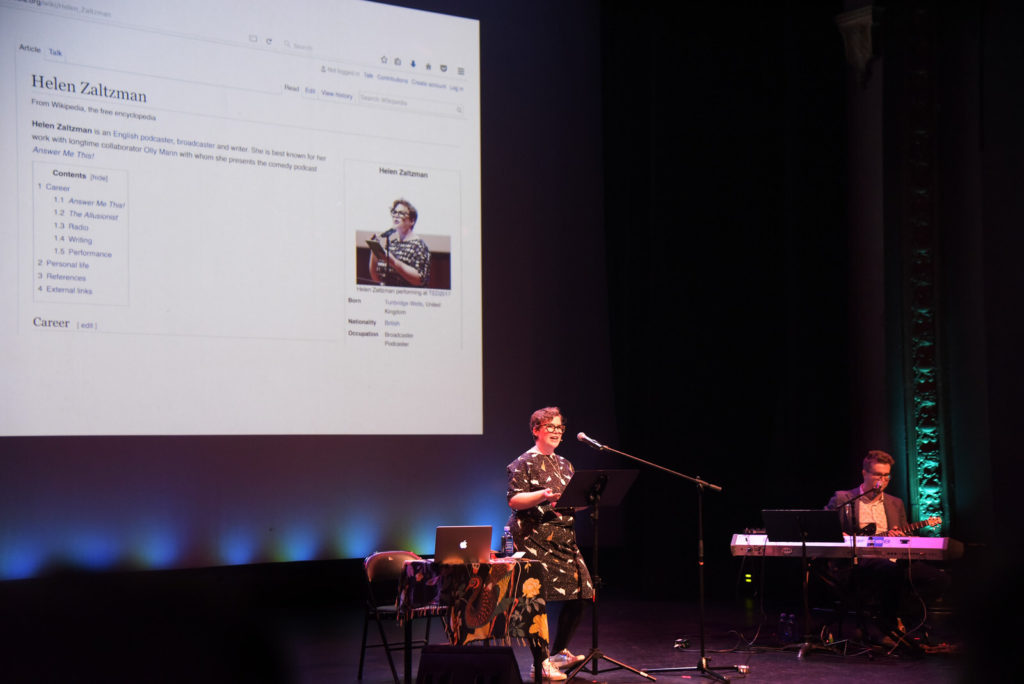How do you pitch a podcast? People on the web Have Answers. A Google search tells me I need to “know the right person” (1,000-word essay), “listen to the shows” (lo-fi YouTube vid), or “if you’re doing good work, the networks come to you” (angry man on Reddit).
“And I think making a podcast is a pretty effective way to ruin something you love.”
Helen Zaltzman has a better tip. Get one of the world’s biggest podcasters in your home, wait til he’s weak, and take advantage of him.
Today Zaltzman herself is one of Britain’s most decorated podcasters. Her Radiotopia show The Allusionist—a pod all about words, their origins, and meanings—has stretched 120 episodes (plus a bunch more bonus and follow-up ones). It has spawned live shows, TED Talks, merch, fan art—even academic speeches.
Beyond that, Zaltzman has become one of the industry’s loudest cheerleaders for new talent, despite Serial and other blockbuster successes bringing an increasing number of traditional media wonks to the table. She runs the 25,500-strong Podcasters’ Support Group on Facebook, an Alexandria of knowledge ranging from pitch tips to the best ways to hold a mic.
The Pitch
The Allusionist began life six years ago, in a leafy corner of London.
It was 2014. Zaltzman had hosted Answer Me This with fellow writer and comedian Olly Mann since 2007—“before podcasting was cool,” she says. A monthly show featuring listener questions on just about anything, AMT had won a bunch of awards (Sony Radio Academy Awards — Silver in 2010 and Gold in 2011, a European Podcast Award in 2012), and was now one of the UK’s longest-running podcasts.

Zaltzman, a veteran of traditional radio, loved podcasting’s intimacy and its low barrier to entry. She often hosted when they came to London—a generosity that would come in handy now that . Zaltzman had a new idea of her own.: 99% Invisible, but for language. She had little beyond a pithy phrase: ‘Word Detective.’ But, she says, “I’m no good at pitching. I can’t do the elevator pitch.”
However, Zaltzman had Roman Mars, 99% Invisible’s creator and chief at Radiotopia, who was visiting for a live event and staying at her house. As the pair strolled through a park, Mars “jetlagged and vulnerable,” Zaltzman saw her chance.
“You just use what’s available”
Zaltzman and Mann had started AMT in a living room, with nothing but a copy of Podcasting for Dummies for guidance. It worked. Now she lives, by her own admission, an “itinerant life,” and since she’s always on the move, there’s little room for studio tricks. The Allusionist owes its production value instead to Zaltzman’s ingenuity. She records a lot of episodes in her bed because it’s often the most acoustically-absorbent place available. Once, Zaltzman was staying with a friend on a busy Vancouver intersection. “All the rooms faced out onto the loud roads, except for the nook in which the washer-dryer was. This tumble-dryer was at head height, so I filled that up with cushions and put the mic in it,” she says. “You just use what’s available.”
The resulting podcast digs deep into the origins and history of words we often take for granted. There are episodes on ”gossip”, “queer” and “Polari”, a slang language used by LGBTQ+ Britons in the 19th century. Zaltzman is funny, conversational, and fond of the odd naughty word—at the show’s inception, she recorded an entire episode on “c*nt”. “That’s still a lot of people’s favorite episode,” she says, “and that’s annoying because it’s episode four.”

Zaltzman grew up listening to the pipe-and-slippers documentarian style of BBC Radio. While she may have absorbed many form and function lessons from her years of listening, she disliked its background-heavy storytelling, an “eat your vegetables” delivery that she felt condescended to listeners
Tending towards the “underinformative,” Zaltzman argues, works better for podcasts. So too a linear narrative, unlike other forms of writing. “It’s remembering that people can’t glance back a page easily, and if you lose them with a looping narrative, it’s very hard for the listener to come back,” she says, in stark contrast to fellow Brit Ross Sutherland (Zaltzman has championed Sutherland’s psychedelic pod Imaginary Advice).
“I want it not to be didactic. I want people to feel a part of it—even though it is one-sided,” she adds. “It was about making people feel a part of the conversation even if they weren’t there…I think the way that broadcast radio would deal with it is by constantly recapping what you’re hearing, because they assume you’ve tuned in halfway—which in a podcast you don’t have to assume. For me, it’s about trying to throw in just enough information that’s comprehensible without derailing things, whereas in a book you can have footnotes or an appendix.”
Zaltzman has stuck to that ethos with The Allusionist. She even records so-called “Tranquillusionist” episodes, in which she reads the names of television episodes, or the names of dogs that have won Best In Show at the Westminster Kennel Club Dog Show in New York.
It’s a fun addition. But the main thrust of the show has always been the same: tell a secret about something people think they know.
A Democratizing Media?
Zaltzman believes new podcasters should have a concise, simple mission statement, “because it’s an anchor to figure out what you’re going to make. For me it means it can be pretty much anything, but it always has to come back to language.”
But above all, Zaltzman claims, creating a successful podcast isn’t chiefly about passion. It’s about graft. “Being passionate about something is not the guiding force I would look for,” she says. “And I think making a podcast is a pretty effective way to ruin something you love. You have to spend so much time with it—it’s hard work—but still do it. There are tons of reasons you can talk yourself out of a creative project, but anyone has as much right to make a podcast as anyone else.”

It’s that final statement that epitomizes Zaltzman’s view on new podcasters: come one, come all. “One of the things that makes me care about podcasting so much is, people say it’s a very democratizing media,” Zaltzman says. “Which isn’t fully true: there’s a cost for equipment, and a time cost that is insurmountable for a lot of people. But I do think it is good not to need a lot in terms of equipment, and you can do so much with fairly low-expense stuff.” ‘Podcasters’ Support Group’ has become one of the industry’s leading insider tools. Zaltzman cheers on new titles endlessly across social media (and takes on annoying journalist follow-up messages with a smile).
“She has given away more free time than anyone else,” says Devon Taylor, a podcast editor, onetime critic, and friend of Zaltzman’s. “She wants to use her power and privilege for good. I don’t think people realize just how often she’s mentoring, or encouraging, or just considering the way the world is shifting and considering how she can shape it in a way that feels positive.She’s an absolute advocate for people’s work, whether it’s podcasting or writing, or live events or anything. She’s such a mentor to people.”
It’s tougher to break into the industry today than it used to be. “I thought podcasting was a good alternative to industries that had not really employed people like me, or had not really appreciated the talents of the people it did employ,” Zaltzman says. “But because so many public radio employees are now running podcast companies, it’s the same old shit. And they brought with them a lot of their cultural biases.”
That is a worrying—but possibly inevitable—reality about a market that once offered diversity to embarrass radio, TV or print media. Still, Radiotopia is hardly Fox. Podcasting’s low entry barrier ensures there may always be a roll-call of exciting new voices to fill people’s devices.
Zaltzman will continue producing new and exciting episodes of The Allusionist, too. Oxford and Merriam-Webster claim there are around 470,000 words in the English language. Even at Zaltzman’s two-a-month pace, she’ll be roughly 2,000 years old before completing the set.
That seems a stretch. But you can be certain Zaltzman will continue making some of the industry’s most striking content—and giving starter-outers the help they need to survive. Not everyone’s got Roman Mars living in their spare bedroom.
Editor’s Note: As of the date of publication, the most recent episode of The Allusionist is a replay of a show they did in 2017 on the language of migration indicating that this is an evergreen topic of importance. We agree so we have included it here.




Comments